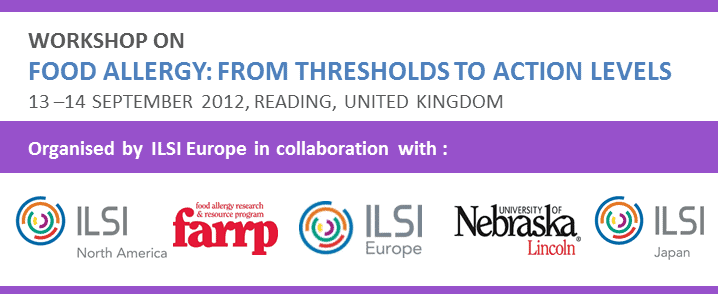Reading, United Kingdom
13/09/2012 – 14/09/2012
BACKGROUND
Operational management of allergens still suffers from the lack of an agreed set of reference values defining a tolerable level of risk. As a result, standards to which industry operates still lack consistency, to the detriment of allergic consumers who are faced with a proliferation of precautionary labelling, as well as the food industry who cannot communicate clearly the meaning of such labelling. A further consequence is that precautionary labelling is devalued, and risk-taking behaviour increased.
Over the last few years, much new low-dose challenge data have become available and tools to analyse these data and apply them to quantitative risk assessment have also continued to develop. Population dose distributions for many regulated allergens have thus been developed and risk models elaborated to estimate the population impact of defined contamination patterns.
These developments make it possible to set reference values for these allergens which minimise the risk of allergic reactions. They addressed the major knowledge gap in quantitative risk assessment by application in allergen management thereby improving both safety and quality of life for allergic consumers, a major public health objective.
Since its creation in 2010, the ILSI Europe Expert Group on “From Thresholds to Action Levels” has been working on a draft manuscript, using the Australian Allergen Bureau VITAL scheme as a model. This draft manuscript was shared with participants prior to the event and served as working document during the workshop.
OBJECTIVE
The objectives of the workshop were:
- To share the work and conclusions of the expert group commissioned by the ILSI Europe Food Allergy Task Force with key stakeholders and solicit their comments;
- To foster a consensus over the feasibility of defining reference values, the approaches used and the data and knowledge gaps still to be addressed.
OUTCOME
The outcome of the workshop will be a manuscript summarising the draft report of the expert group and the findings and conclusions from the workshop discussions, which will be prepared for publication in a peer-reviewed journal.
PROGRAMME
To download the programme, click here.
PRESENTATIONS
SESSION 1 - Evolution of risk assessment for food allergens
Welcome and opening of the workshop
D. Bánáti, ILSI Europe, BE
PDF
Objectives of the workshop
R. Crevel, Unilever, UK
PDF
Approaches to risk assessment for food allergens
C. Madsen, Technical University of Denmark, DK
PDF
Practical applications: VITAL v1.0
K. Grinter, Allergen Bureau Australia New Zealand & Nestlé, AU
PDF
SESSION 2 - Characterising the risk: data sources and integration
Patient-derived data: sources, strengths and limitations
J. Hourihane, Cork University Hospital, IE
PDF
Dose-distribution modelling and derivation of reference doses
J. Baumert, University of Nebraska - FARRP, US
PDF
Using intake data for exposure assessment
C. Madsen, Technical University of Denmark, DK
PDF
Using contamination data for exposure assessment
J. Baumert, University of Nebraska - FARRP, US
PDF
Illustration of probabilistic risk assessment approaches
G. Houben, TNO, NL
PDF
SESSION 3 - Translation to risk management
Defining risk management objectives
R. Crevel, Unilever, UK
PDF
Integrating severity into the risk assessment
C. Mills, University of Manchester, UK
Analytical considerations
S. Flanagan, Kraft Foods, UK
PDF
Food allergen labelling regulation and its implementation in Japan
M. Shoji, Morinaga Institute of Biological Science, JP
PDF
The industry perspective
S. Ronsmans, Coca-Cola Europe, BE
PDF
The regulators’ perspective
S. Hattersley, Food Standards Agency – FSA, UK
PDF
Translation to risk management: the health practitioners’ perspective
C. Venter, University of Portsmouth, UK
PDF
The perspective of the allergic consumer
F. Timmermans, European Anaphylaxis Taskforce & Netherlands Anafylaxis Netwerk, NL
PDF
SESSION 4 - Moving forward: allergen management in the 21st Century
The effect of model choice and data source on threshold dose estimation
E. Kwegyir-Afful/S. Luccioli, U.S. Food and Drug Administration – FDA, US
What data do we have already and where are the gaps?
S. Taylor, University of Nebraska – FARRP, US
PDF
A vision for allergen management
R. Ward, Consultant for PepsiCo International, UK
PDF
VENUE
The workshop was held at:
The Crowne Plaza Reading Hotel
Caversham Bridge, Richfield Avenue
UK – Reading, Bershire, RG1 8BD
Tel: +44 (0) 118 925 99 88
Fax: +44 (0) 118 939 1665
www.CP-reading.co.uk
ORGANISING COMMITTEE
Dr. Joe Baumert, University of Nebraska, US
Dr. René Crevel, Unilever, UK
Ms. Sue Hattersley, Food Standards Agency - FSA, UK
Dr. Geert Houben, The Netherlands Organisation for Applied Scientific Research - TNO, NL
Dr. Jonathan Hourihane, University College Cork, IE
Dr. Charlotte Madsen, Technical University of Denmark, DK
Prof. Stephen Taylor, University of Nebraska, US
Mr. Frans Timmermans, European Anaphylaxis Taskforce & Netherlands Anafylaxis Netwerk, NL
Dr. Rachel Ward, Consultant for PepsiCo International, UK
Ms. Athanasia Baka, ILSI Europe, BE
EXPERT GROUP ON FROM THRESHOLDS TO ACTION LEVELS
Dr. René Crevel - Chair -, Unilever, UK
Dr. Joseph Baumert, University of Nebraska, US
Dr. Yong Joo Chung, Nestlé, CH
Ms. Magdalena Haponiuk*, European Commission - DG Health and Consumers, BE
Dr. Sue Hattersley, Food Standards Agency (FSA), UK
Dr. Corinne Herouet-Guicheney, Bayer SAS, FR
Dr. Geert Houben, TNO Quality of Life, NL
Dr. Jonathan Hourihane, University College Cork, IE
Dr. André Knulst, University Medical Centre Utrecht, NL
Prof. Marek Kowalski, Medical University of Lódz, PL
Prof. Alfonso Lampen, Federal Institute for Risk Assessment, DE
Dr. Charlotte Madsen, Technical University of Denmark, DK
Dr. Hubert Noteborn, Dutch Food and Consumer Product Safety Authority, NL
Dr. Nikolaos Papadopoulos, University of Athens, GR
Dr. Fabrice Peladan, Danone, FR
Mr. Frédérique Respondek, Tereos-Syral, FR
Mr. Stefan Ronsmans, Coca-Cola Europe, BE
Prof. Stephen Taylor, University of Nebraska, US
Mr. Frans Timmermans, Nederlands Anafylaxis Netwerk - European Anaphylaxis Taskforce, NL
Dr. Rachel Ward, Consultant for PepsiCo International, UK
Prof. Margitta Worm, University Clinic Charité Berlin, DE
Ms. Athanasia Baka, ILSI Europe, BE
* Observer
